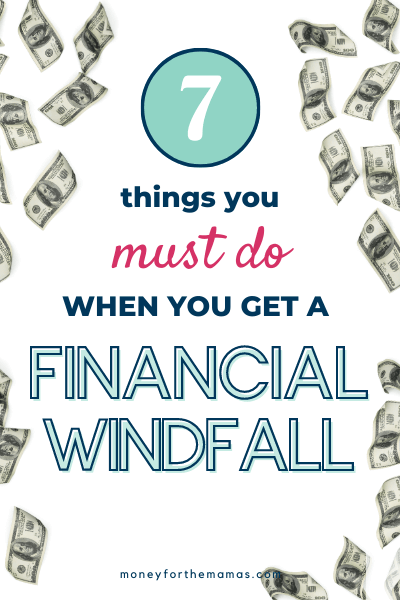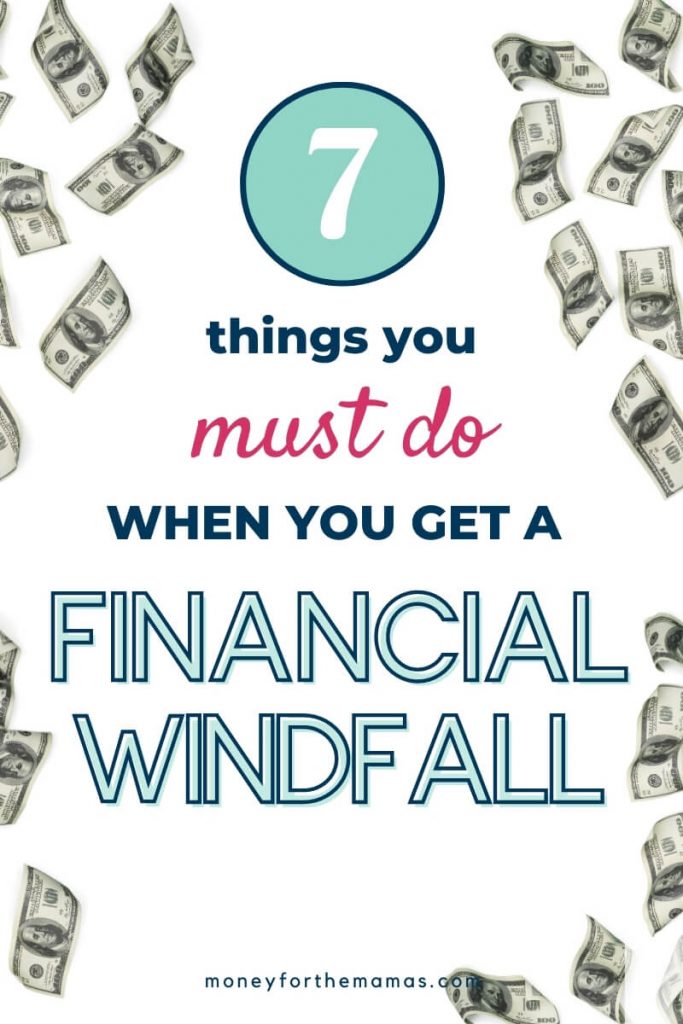How to Make Your Financial Windfall Actually Change Your Life (for the better)!
The 7 steps you need to take to set your family up for long-term success when you get a financial windfall

Author: Kari Lorz – Certified Financial Education Instructor
Well, hot damn! You have got a fat amount of cash burning a hole in your pocket! It’s time to go and party! Hold it!
Yes, you can think about vacations and a new iPhone, but wouldn’t it be great if this money could benefit you not only today but every single day from here on out?
This financial windfall could set you up for success forever (if you’re careful). This is security for you and your children, which is what you really want, right?
Let’s dive into what to do (and what not to do) when you get a financial windfall.

This post may contain affiliate links. If you make a purchase, I may make a commission at no cost to you. Please read my full disclosure for more info
Do you actually have the money in hand?
Just because you are going to get a lot of money, it doesn’t mean that you go out and spend it today! You never know how long it may be until the unexpected windfall clears your account. You certainly don’t want to put a large purchase on your credit card now and rack up high-interest debt for months and months until the funds clear your bank account.
Besides, the amount that you think you may get may not be what you actually get. For example, it would totally stink if you thought you were getting $3,000 from a tax return (because that’s what you got last year, and nothing changed since then).
Oh, but things do change! This year you are only getting $1,200 back. If you have already spent $2,500 in anticipation of getting $3K, then you are in for a world of hurt!
So don’t make a big financial decision (aka buy anything expensive) until you have the money in your bank account. Just don’t.
The steps that smart people take with their money
1. Slow down
It is natural to be excited about coming into a sudden wealth, and depending on the size of that chunk-o-change you should SLOW DOWN on doing & saying anything to anyone.
If it’s just a small amount (less than $5K or so), then you can go about your business working through the steps. If it’s over $20K, then maybe you need to do some professional financial planning.
Now I don’t mean asking your brother for his advice. In fact, I mean the exact opposite. I hate to say this, but you should keep these cards close to you. When windfall recipients talk about getting money, it attracts attention, and that’s not always good. Ya know what I mean?
In regards to professional advice, you may want to talk to a lawyer or a certified financial planner. This would be the smart thing to do.
2. Fill your emergency fund with your financial windfall
This piece of advice isn’t the most glamorous, or sexy, but there’s a reason that expert after expert recommends this step! late last year, Marketwatch reported on the Economic Well-Being of U.S. Households report (source)
“…where 4 in 10 US adults couldn’t cover a $400 emergency if it came up. That means it’s going on the credit card to rack up interest, costing you a lot more in the long run.” This type of financial stress is slowly but surely wearing your mind, body & heart down.
That’s scary and sad. Let’s make sure that you’ve got the possible emergencies covered. It’s such a relief to know that if something terrible happened, like a recession or economic downturn, that my family would be okay. We wouldn’t need to sell anything, nor borrow to cover the cost. Seriously, it’s a HUGE comfort to me personally.
Many people want to know how much to put in their emergency fund, and the traditional advice is six months of living expenses, while some say 3-6 months, and others a year. It all depends on your emergency. In most cases, people have this fund in case they lose a job, sustain a medical need that leaves them unable to work, etc.
It’s important to decide with your spouse what is and what isn’t an emergency. For example, new tires for your car are probably not an emergency; as you knew you’d need new tires at some point, you should have been planning for that purchase.
For my family, we only touch our emergency fund if it’s a loss of a job or a significant medical expense that insurance won’t cover.
I’m not saying that you should drop all of your financial windfall into your emergency fund, but put a decent chunk in there, say 50% of whatever money you came into. Or enough to cover at a minimum one year of living expenses.
Saving money doesn’t have to feel like a drag, make it fun with some great printables to help you keep track of your savings!
One of the great things about having an Ally savings account for our Emergency Fund is that it earns a much higher interest there than it would at our regular bank. Every day banks typically offer horrible interest rates on savings accounts, like .08% APY, while some even go as low as .01%. While Ally is now offering 4.00% (as of October 2023), this could change at any time.
Ally Bank is so consistent with its returns, service, and features that Money Magazine rated them one of the Best Online Banks of 2023 (source)
3. Spend some on whatever you want!
Yup, you heard me! You should take 5% of the money and spend it on whatever you want to, a spa day, a new game console, a trip to a swim park, whatever. Go have fun!
Deprivation is a surefire way to burn out and just give up and quit. You need to be responsible with your money, but you also need to live (just a little!).
Caveat: If you have been known to be a little splurgy splurge in the past, you really need to EXTRA planful with this. Because this is the spot that most people will get tripped up on.
This is not the time to buy your niece’s dog a diamond collar. Everyone seems to think the money will last forever, but it won’t. Don’t be stupid like these celebrities who filed for bankruptcy! Their sudden money & fame didn’t help them at all; in fact, it ruined them.

4. Attack high-interest debt like a ninja
If you have your emergency fund covered, then next up on your financial plan should be to focus on paying off any high-interest rate debt, such as credit cards. Interest rates can kill you, albeit a slow and quiet death, but painful.
You see, interest rates fees were so painful, and so many Americans didn’t even realize they were being drained from this, that the Credit Card Accountability Responsibility and Disclosure (CARD) Act of 2009 was signed in by President Obama.
There were 12 primary protections, but today let’s talk just interest rates. Now credit card companies have to tell you how long it would take to pay off your card, and how much interest you would accrue if you only paid the minimum payment.
For example, my family’s last cc bill was for $2,600. If I made only the minimum payment, it would take us 17 years to pay it off, with a 15.9% APR. OMG! That $2,600 bill would end up costing us $5,585, that’s crazy!
Pay off your debt, and pay it off now.
If you’re like, “Honey, I’m on it! I want that debt gone!” Then be sure to check out some of the fun debt payoff printables that I have. You can visually see how far you have come with dumping your debt, which is so motivating!
Another way to keep motivated with paying down your debt are the wise (but sometimes brutally truthful) words of those that have come before us. Check out the top 50 debt quotes guaranteed to help you conquer your debt!
I know that paying off your debt doesn’t sound like fun but it’s honestly the BEST way to use a financial windfall! I promise!
5. Set up your sinking funds
You have your emergency fund, and you’ve gotten rid of high-interest debt! Boo-yah! It’s time to save some $$$.
I honestly think that sinking fund accounts have been the saving grace of my family’s finances! They are what I base all my other budget items around, and will continue to do it this way because it 100% works!
In a nutshell, you are saving money for specific, yet now unknown purchases. For example, we have a house fund, a car fund, and a vacation fund. We put money into these accounts every month, and then when we have a car repair, or need to get new tires the money is already there. Setting up your sinking funds is exciting because you’re working on your goals (vacation, new home, etc).
If you want to see exactly how we pay for everything with sinking funds then check out the post below…
RELATED: The Smartest Strategy to Saving Huge Stacks of Money
Now you don’t need to fully fund these accounts. You just need to set up the checking accounts and deposit enough money to give them a good base to start from. Using part of your financial windfall for this is a great idea!
Another great idea is to set aside some money for your Christmas savings! It’s never too early to start planning for Christmas… right? Because getting that fat credit card bill in January is no fun, this way you can completely avoid it!
6. Tackle low-interest debt
Due to a lot of financial planning and strategic spending, this is where my family is right now. We have zero debt (besides our house), and our sinking funds have a good amount of cushion. So we can now focus on our future, paying off low-interest debt and saving for retirement. These two options can run congruently, side by side, as you will be focusing on these financial goals for a long time coming.
For our family’s taxes, we plan it so that we get money back every year. We do this specifically so we can make an extra mortgage payment, yes a principal-only additional payment. I am a fiend for mortgage payoff calculators, and it kills me to see our home loan initial purchase price, and then to figure out how much extra in interest we are paying for it!
I sure don’t want to pay $200,000 extra for something, do you? Nope, I didn’t think so. So we take any extra amounts that come our way and we make an extra payment.
7. Save for the future
Retirement:
We also contribute to our workplace 401(k)’s and my IRA. A good rule of thumb is to be saving about 15% into these accounts, but don’t worry you can start at a smaller amount and slowly work your way up.
If your work has a retirement plan then be sure to contribute the amount to get the full match. That means if you contribute say 3% then they will also contribute 3% of their money to your retirement investment plan. Nice!
Sometimes your workplace will bring in an independent fiduciary to answer staff questions, be sure to ask your HR dept if this financial planning option is possible.
I know that investing can seem intimidating at first, which is fair, as you can lose a lot of money if you try and game the system. Ask a trusted friend (who seems to have good sense) if they recommend a financial advisor. Or you can put your retirement savings in INDEX funds which is the slow and steady path to wealth building. Look at some of the trusted firms in the industry (i.e. Vanguard, Fidelity, ETRADE, etc).
College education:
We also contribute to our daughter’s ABLE account, which is similar to a 529 college savings account, yet it’s for children with disabilities and can be used for a few more things than just education.
Regarding higher education, it’s amazingly disheartening that as a society, we place so much importance on higher education, yet we make it ridiculously expensive, which makes it out of reach for most students. In order to get a degree, they burden themselves with crippling debt.
According to Student Loan Hero “Among the Class of 2018, 69% of college students took out student loans, and they graduated with an average debt of $29,800, including both private and federal debt. You’ve probably heard another scary statistic: Americans owe over $1.56 trillion in student loan debt, spread out among about 45 million borrowers. That’s about $521 billion more than the total U.S. credit card debt.”
As parents, we want the very best for our children, so I feel if we are in a position to save them decades of debt and stress, then I absolutely want to do that. This doesn’t mean that my daughter will get a free ride and have zero financial responsibility, she will have to pay some of her way, but I don’t want her to get an ulcer from the financial strain of attending college.
Where did the financial windfall come from?
You may not think that this matters, but it does! The sheer joy of sudden wealth can cause so many emotions that can override other, more subtle feelings. It’s definitely worth it to take the time to pause and reflect, then make a financial plan to spend, save, and invest.
You don’t want to blow through all the money within two years. No one likes new money showoffs.
Money from an inheritance
If the money has come from an inheritance due to a loved one’s estate plan, there are a lot of factors that come into play. Your emotions will go through a lot of changes; sadness at the loved one passing, overwhelmed at thinking of everything that needs to be done, relief knowing that money will be coming, guilt from thinking about the money, sadness again and again.
Financial experts agree that if you receive a large amount of money from an inheritance you take at least six months and do nothing with the money. Let your emotions settle, think of all the things that you would like to do with the money, and let those thoughts turn over in your brain for a time.
Because how many times have you done something and then regretted it later? If you’re human, like me, then you’ve probably done this a lot. Waiting is key to being thoughtful and doing the smartest thing with your newfound wealth.
Also, consider that there will be costs to be paid for, probably estate tax and the cost of an estate planning attorney or a financial advisor. You’ll also want to think about your own tax implications and consider doing some charitable giving to offset any gains. Or if selling real estate comes into play, there may be capital gains tax.
All that to say, you might not be getting as much as you expected, and it may take a while for everything to go through probate court (if the loved one didn’t have a Trust set up for their assets.
But while you wait for things to settle, do find a trusted financial professional who can guide you through the process.
Money from a big tax return
Whew! You didn’t owe anything, you didn’t think you would, but it’s still a worry for people. It’s funny how people view a tax refund. If you owe, then you’re silly for not planning accurately. If you got your money back, then you’re silly for giving the government an interest-free loan over the year.
There’s some truth to this last bit of advice, but it all depends on how you use the return. If you blow it all on wants (vs. needs), then it’s kind of silly. Yet, if this lump sum helps you achieve your long-term financial goals, then maybe this was a good strategic move. My husband and I get money back on purpose for a specific reason; more on this a little later.
Money from a job severance or severe injury
Firstly, I’m so sorry that this has happened to you. Either of these scenarios is scary and can be depressing. I urge you to take time to mourn the change, don’t hide from your feelings. Feel all the feels, let your brain and heart process what has happened, and then pick yourself up and get back in the game!
I want you to hold onto this money! Don’t spend it on anything other than necessities for now, i.e., rent/mortgage, utilities, groceries, gas for your car. You need to make these funds LAST AS LONG AS POSSIBLE. You never know what the future may hold, so don’t tempt fate to kick you while you’re down.
If you were in an accident, it might take months for all the aches and pains to develop, and then settle a claim. Or, getting a comparable job could take a long time due to possible economic changes. So take into account your current financial situation and what that looks like five months from now and a year from now.
Okay, so now you have the money in your bank account, and you’ve processed all the feelings and such. What now? Well, depending on your situation, you have a couple of options that are very smart and strategic. Use this cash windfall to the fullest potential, and it can set you up for a long time!
You won the lottery
First off, CONGRATULATIONS! Was your right-hand itching? (It’s a fun old superstition) Secondly, I want you to look at yourself in the mirror and say, “Don’t be stupid, be smart!” Repeat that to yourself many, many times!
According to Benzinga, ” Nearly one-third of U.S. lottery winners declare bankruptcy, often within just a few years of their big win”. And that’s the bankrupt ones, many more spend down to nothing yet don’t file for bankruptcy. There are a ton of horror stories online, please do by all means Google them and read on!
Next up, write down everything that you want right now, within one year and in 5 years. Hold onto that list, keep it close. DON’T BUY ANYTHING, but let your mind have fun! Of course, you can go for a fancy dinner to celebrate, but no cars, vacation homes, or gold toilets.
Next up, hire a lawyer, go see a financial planner and tell no one else. Call out sick to work (I hear that mono lasts a long time). A financial advisor will help you plan what to do with your sudden windfall (after the taxman takes their hefty cut). Use this money to change your family’s life (for generations) not just to have fun for the next 3 years. Follow the steps laid out below, do them slowly and methodically!
At the end of the day
All of these smart financial steps could be used for everyday earnings, not just a financial windfall. In fact, these are the steps that my husband and I took a little over five years ago.
We started out $17K in debt, but we worked, and thoughtfully planned (with the help of a financial planner) our way out of the hole we were in. We thought of scenario A, B, and C, which would take us farther or faster.
Whatever choices you make, I want you to be sure that you have considered all your options and even thought about the opportunity cost of spending your money on certain things. Opportunity cost being, if I spent my money on X, then that means I can’t spend it on Y, and it will impact us in this specific way.
Thank the heavens for your good fortune, or thank yourselves for your hard work, and now start the exciting part of thinking of all the possibilities that are open to you due to this newfound wealth! Have fun!
Related articles to cash windfall:
- How to Dump Your Financial Stress
- How to Use Sinking Funds to Save Money Every Single Month
- Credit Card Interest Rate Fees Might be Killing You
- How to Prepare for a Recession
- Debt Payoff Printable Worksheet




Great advice! We have a good tax return coming this year and have already decided that we will take the $$ necessary out of it to book our 2 week-long camping trips for the season. That being said, we were booking those trips anyway… but prepaying them now means that it frees up that funding later in the year that we had budgeted towards it. So not really splurging but knowing we’ve booked the campsites I’ve been eyeing up gives me the feeling like I splurged and helps me to avoid the temptation to spend on unnecessary things lol
Absolutely, setting money aside for a known purchase takes so much of the weight off of it!
That first part – don’t spend it before you get it – is soooooo important. As the saying goes, don’t count your chickens before they hatch!
Absolutely! So funny, I was thinking of that same saying!
I love this! My husband and I always spend responsibly, and strive to save as much as possible.
So glad you guys are on the same page!
These are great nuggets of wisdom! The worst thing that can happen after a windfall is just spending it all on a whim! Thanks for sharing!
Sure, it would be fun to spend it all like crazy, but you’d absolutely regret it later!
All of these are fantastic! I need to work on these. I love the sinking funds idea, I never heard of that before. I also need an emergency fund. I pinned the post for later, thank you!
So glad you liked it Desiree!
Wow. This is such great advice. Thanks.
So glad you liked it, thanks for stopping by!
Such good and practical financial advice especially with tax season coming up.
So glad you liked the post! Yes, tax season, everyone’s “favorite” huh! ha ha!
More people need to know this! I’m working on getting my finances together, and I will definitely use some of your tricks ?
I’m so glad you’re taking action!
It is so true that money burns a hole in people’s pockets! I guess when you’re not used to having any it’s like being a kid at Christmas, now you can have everything! For me, it’s so much more rewarding to know that I have money available. And truthfully, the more money I have the less material stuff I want (go figure)!
I am right there with ya! More cushion in the bank and no more “stuff” in the house (because I’d only have to clean it up when my little one plays with it!)
Hey Kari, Thank you so much of this awesome article with wise advice. A windfall for me on the larger side would be purchasing a home in cash. On the lower end it would be used to eliminate debt & add to savings.
Eliminating debt is a great way to use a cash windfall! I’d probably look into buying a house too!
Very informative and useful post!
It’s so important to be strategic with our finances – a large cash influx is great, until you spend it all and are left with nothing.
Boo! Being left with nothing sounds like a bummer plan!
Great looking post and informative!
Taking your time and taking advice definitely help avoiding any big mistakes with a cash windfall.
I totally agree, getting professional advise (who’s not selling anything) is key for an unbiased opinion about which course is best for your situation.
Great tips on how to handle a cash windfall. The biggest mistake people make is they nust don’t give themselves time to think logically about what they should do with the money. I’ve watched two people I know personally blow through an inheritance and end up broke again. It’s all about choices and thinking long term.
So true, I think the time piece is essential to doing the right thing for long term benefits!
Thank you for sharing this because I want to make sure I get the most of my money. I also don’t want to overspend!
Yes! Getting the most from your money is key!
This post was so helpful that I am actually guilty of spending up my money. But now I am surely going to make real changes
Ha ha! No guilt needed, you should spend (some of) it! 🙂